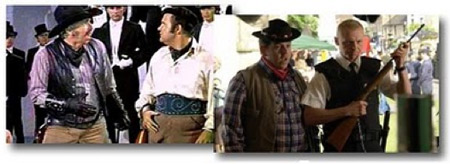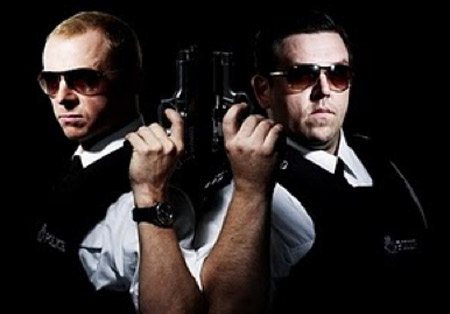Distant Relatives: Blazing Saddles and Hot Fuzz
 Thursday, January 6, 2011 at 7:58PM
Thursday, January 6, 2011 at 7:58PM Robert here, with my series Distant Relatives, where we look at two films, (one classic, one modern) related through a common theme and ask what their similarities and differences can tell us about the evolution of cinema.

Bad boys, bad boys, whatcha gonna do
It shouldn't come as a shock that Blazing Saddles and Hot Fuzz have basically the same setup: outsider comes to small town where he has a hard time fitting but eventually becomes the only man who can save the village. It's not that Edgar Wright and Simon Pegg and Mel Brooks and his co-writers all coincidentally had the same idea. Truth is, the western and cop movie, the two genres being spoofed here, are the same genre only set 100 years apart or so. In both cases, an outsider protagonist (not even literal outsiders, moral outsiders like High Noon's Gary Cooper or Serpico's Al Pacino work too!) creates drama by pitting the hero against insurmountable odds in an environment he doesn't know. In both cases a lovable sidekick helps grund him and a conflict only he can solve elevates him to hero status (in terms of both his success and rare skill). The protagonists of Blazing Saddles and Hot Fuzz couldn't be more different but they're similar in that they contradict expectations set up by their genres' more serious films. Nick Angel (Simon Pegg) is a good cop who plays by all the rules. He isn't exactly Detective Riggs. Sheriff Bart (Cleavon Little) is vulgar, vain, charming, clever, and doesn't care to know the rules enough to break them. He isn't exactly John Wayne. The towns they inhabit, aren't so much contradictions of cultural portrayals as exaggerations. The town of Sandford is comically peaceful, playing off the idea of the quaint and safe countryside of movies like Local Hero. Rock Ridge has fun with the towns of the old west, with cows rummaging through churches, and citizens all named Johnson.
The protagonists of Blazing Saddles and Hot Fuzz couldn't be more different but they're similar in that they contradict expectations set up by their genres' more serious films. Nick Angel (Simon Pegg) is a good cop who plays by all the rules. He isn't exactly Detective Riggs. Sheriff Bart (Cleavon Little) is vulgar, vain, charming, clever, and doesn't care to know the rules enough to break them. He isn't exactly John Wayne. The towns they inhabit, aren't so much contradictions of cultural portrayals as exaggerations. The town of Sandford is comically peaceful, playing off the idea of the quaint and safe countryside of movies like Local Hero. Rock Ridge has fun with the towns of the old west, with cows rummaging through churches, and citizens all named Johnson.
That's Entertainment
Each film skewers the genre it spoofs and eventually becomes. How do they do this? First by establishing a world where everyone knows the elements of that genre. In Hot Fuzz it's easy. Since the film is set in modern time, anyone can go down to the local store and rent a copy of Bad Boys. In Blazing Saddles, while it seems like a good assumption that no one there has seen a western, they still know their roles, appreciating good old fashioned gibberish, getting annoyed at classic western cliche and genuflecting the very mention of Randolph Scott. By giving everyone an understanding of how their world "should" work, they've made them extra-aware of when it's not actually working in that manner, like when a series of unusual crimes begin to unfold.
If comedy is inconsistency, then Brooks and Wright set up meta-levels of self awareness by which the characters can be inconsistent. Each film culminates in the ultimate self-aware spectacle. In Hot Fuzz this involves the plot actually turning into that of a generic action blockbuster. For Blazing Saddles, the action literally spills off the lot and onto other films.
But did we learn anything?
The big difference between these two films, as anyone would note, is in social commentary. Blazing Saddles, though often saddled itself with the qualifier "a film like this could never get made today" is an argument for tolerance, using the uber-racist town of Rock Ridge as a mirror for our reality. While one could argue that the small town of Sandford in Hot Fuzz is a take on a "violence begets peace" mentality not uncommon in our world, it might be a bit of a stretch. Hot Fuzz doesn't have a social message. Is that a sign that as satire, message movies are dead?

What Hot Fuzz does suggest however is a reality in which we're so immersed in media and culture that we can no longer separate it from ourselves. Culture is not a reflection of us, instead we are a reflection of it. Blazing Saddles, with its self awareness and unending pop-cultural references often suggests the very same. Both films get their laughs by creating worlds that couldn't exist without the totality of pop to be built upon.
The suggestion that the spoof film is dead is one made not without merit. Such films still get made, just not often well. What the evolution of Blazing Saddles to Hot Fuzz suggests is that while grand social statements aren't necessary, some statement, some observation about our reality is. References to culture alone won't do it. Some greater truth has to be revealed, whether it be the dark side of our society or the overbearing anti-originality tendencies of our culture. There's truth there. And truth is funny.



Reader Comments (3)
Every time someone writes about BLAZING SADDLES i experience terrible guilt pangs since I have never seen it. However, I do have this nifty Mel Brooks box set (that needs delving into) so perhaps that's next!
HOT FUZZ is very very funny but I'm wondering if this 'lack of message' thing of which you speak and the violence begats peace notion are the double whammy that keep me from truly loving it? I feel at a remove from it even though it's definitely LOL funny. The histrionic sound design alone is just a perfect joke in and of itself.
I think what you're talking about is a fundamental issue with modern comedy films, and probably accounts for why so few are going to be remembered 50 years from now the way Blazing Saddles is.
I felt that was one of the things that made Easy A such a strong film (apart from the brilliant Emma Stone, of course). Beneath all the swagger and the teen movie tropes, it had something very real to say about the messed up expectations teens place on each other in contemporary American society. And turned into a rollicking good ride.
theoncominghope -- interesting. I never think of EASY A as being *about" anything other than Emma Stone's Ascendance but maybe you have a point. I wish the whole film had risen to her level (though admittedly that's a tough task.) but i think there's some huge insurmountable problems in it (mostly in casting and scattered attention)